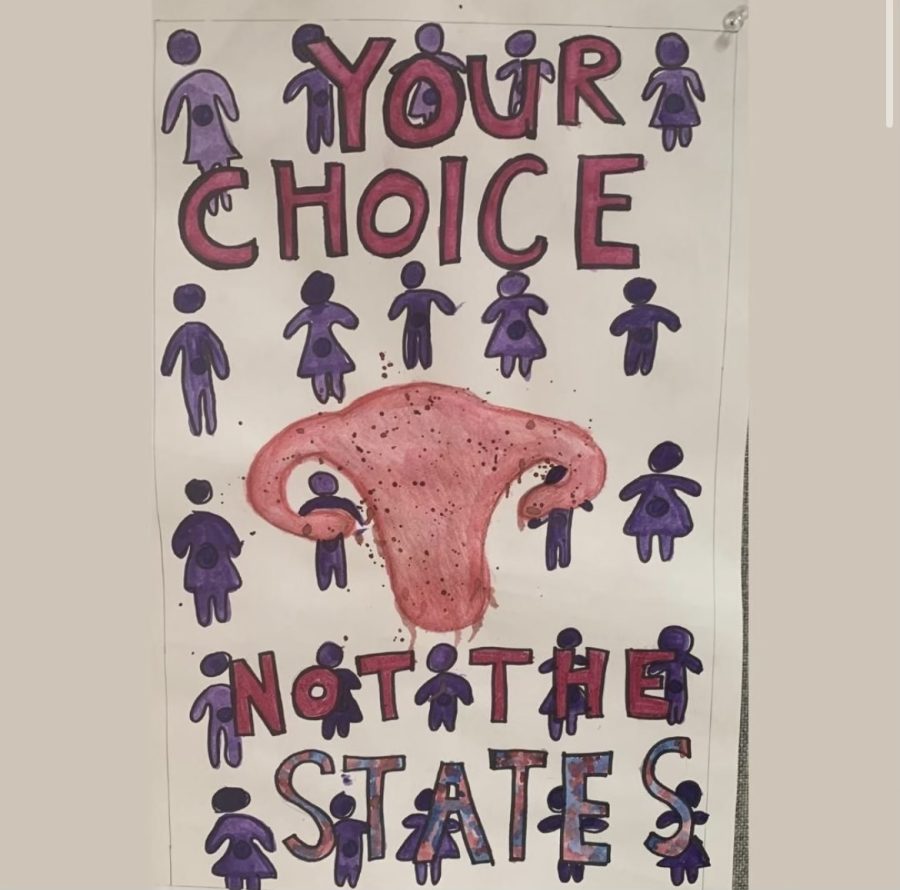Fulton county judge blocks Georgia’s six-week abortion ban
Senior Lilah Bransford decided to create this piece for an AP Art “Propaganda” project because she felt that it was the most important issue that spoke to her as a woman right now.
November 17, 2022
Georgia’s six-week abortion ban was overturned on Tuesday by a Fulton County judge, expanding women’s reproductive healthcare access state-wide.
Fulton County Superior Court Judge Robert McBurney crafted his argument on the atypical precedent claiming that the law went against Georgia’s Constitution at the time it was signed into law by Governor Kemp in 2019 and Roe v. Wade was still in effect.
Dr. Kay Levine, Professor of Law at Emory University and Midtown parent, explains the reasoning behind the ruling.
“Because all of the courts nationally had agreed that abortions could not be criminalized before 20 weeks at the time, for Georgia to come up with a statute criminalizing at six weeks was unconstitutional from the get-go,” Levine said. “McBurney is not saying anything about the substantive legality of criminalizing abortion at six weeks but rather he’s saying that [the 2019 abortion ruling] was dead on arrival and was purely symbolic.”
The order means abortion access will return to how it was before this strict legislation was enacted in 2019, allowing abortions to be provided up until about 22 weeks into a pregnancy. As a result of the order, Dr. Katie Babaliaras, a General OB-GYN in Atlanta, will have adapted restrictions on her practice going forward.
“I’ve been talking to my colleagues all afternoon because it allows us to go back to providing full scope reproductive healthcare to our patients who require abortion care for a variety of reasons,” Babaliaras said. “I felt relief after fearing that we were going to back to the pre-Roe days when Grady Hospital had an entire floor dedicated to women suffering from the after effects of septic abortion.”
The ruling has received national support from pro-choice organizations and individuals. The American Civil Liberties Union of Georgia and Planned Parenthood have pushed back against abortion policy nationally thus far, claiming forcing a women to carry a child is a violation of the right to privacy and liberty.
“We celebrate this victory in Georgia that restores the right to abortion and reproductive freedom,” Alexis McGill Johnson, President and CEO of Planned Parenthood Federation of America, said in a press release. “For months, Georgians have suffered the consequences of a cruel abortion ban. Today’s ruling means that patients will no longer be deprived of their autonomy and forced to be pregnant longer than they want to be.”
Midtown sophomore Anna Hutcherson, who spearheaded a rally on May 13, 2022 to protest the leaked Supreme Court brief that previewed the imminent overturning of Roe v. Wade in July, was elated to see the news alerts.
“When I saw the news, I was just like ‘Oh my god!’’ Hutcherson said. “It was so surreal. I hope that this sets a precedent for a future like this in other states.”
The Georgia Attorney General’s Office filed an appeal with the Georgia Supreme Court on Tuesday. Without the parameters of Roe v. Wade, Georgia legislators can work to reenact a similar law to the previous 2019 six-week ban in the upcoming 2023 session.
“Governor Kemp [would have to] sign it again with the political pressure and all the real consequences that the bill would have if passed now,” Levine said. “Then, if a new law is created, that opens the opportunity for a substantive constitutional challenge about abortion access.”
In 2019, the original six-week abortion ban passed by a small margin. Since then, the Republican majority has declined in the Georgia General Assembly and may change the result if a new bill is introduced. This year, according to a new poll by Spia Survey Research Center, nearly 62 percent of Georgians oppose the state’s six-week restrictive law.
“I certainly hope that they aren’t able to pass this bill again as it narrowly passed previously.” Babaliaras said. “And I believe some of the people who voted for it don’t necessarily believe it but felt kind of protected from the consequences of their actions because Roe was still in place. When it has to come up for a vote again, I am hopeful that it will bode well for our ability in Georgia to provide high-quality comprehensive healthcare for women.”
Some Midtown students have engaged in the conversation and commemorated the legislature as a step in the right direction.
“I think [the overturning] is empowering, but it also speaks volumes that this is considered an achievement when it is just common sense,” senior Arden Dalia said. “I hope people view this ruling as a wake-up call.”
This is a developing story and will be updated.








